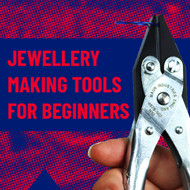Jewellery Making Tools For Beginners
26th May 2023
If you're enthusiastic about making jewellery, but you're overwhelmed with what you'll need to get started, then this guide is for you.
We're going to break down all of the essential tools for jewellery making, perfect for a beginner’s jewellery toolbox.
Side cutters

Jewellery side cutters (also known as diagonal cutting pliers) are likely the most essential part of your tool kit. You can easily cut headpins, stringing wire, eye pins and more.
If you already have a side cutter in your toolbox, you can likely re-use this. However, if you don't, then it's worth investing in a new one, such as these Diagonal Cutting Pliers for Hard Wire (these are good because they can handle even hard memory wire, which most cutters will go blunt with).
Watch our Diagonal Cutting Plier in action here.
You can learn more about side cutters in our blog post here.
Round nose pliers

Round nose pliers are specialist jewellery pliers with various configurations of round jaws, designed to make loops and wrap wires.
The tapered nature of the jaws allows you to create multiple different wire loop sizes with one set of pliers. You make larger loops towards the handle and smaller ones towards the other end. If you want to make consistent-sized loops again and again, you can mark the edge of the pliers.
You can get versions with two round jaws, one round and one flat jaw, and a half round and flat jaw (which is perfect for ring bending).
It's best to go with parallel pliers here, as they offer a firm, even grip on your jewellery elements. There is a good range online here.
You can find out more about round nose pliers in our blog here.
Flat nose pliers

Flat nose pliers are the most basic type of jewellery pliers. They can help you handle a wide range of different jewellery elements, but may struggle in smaller spaces (for that, see the next type).
You should go for a smooth jaw type, to avoid damaging any soft metals.
Watch our Smooth Jaws Parallel Plier in action here.
Go with a parallel action set to give you the best purchase. There's a good 125 mm set here, or a larger range found here.
Chain nose pliers

Chain nose pliers (also known as Snipe Nose pliers) have medium length, flat jaws with no serrated edges, designed for handling fine pieces of jewellery without leaving scratches.
They're designed to work with smaller pieces, offering the precision you need to get it right first time.
They're shorter than needle nose pliers, allowing you to manipulate pieces with more accuracy.
Again we'd recommend going with parallel pliers to reduce the amount of pressure on one single point of contact, such as this set here.
Watch our Snipe Nose Parallel Plier in action here.
Plastic jaw pliers

When you're working with really delicate pieces, you need pliers that are gentle and won't leave any impressions or unnecessarily bend.
That's where plastic jaw pliers come in, offering a secure grip without marks or indenting softer metals, for maximum precision.
Choose plastic jaw parallel pliers to keep the pressure consistent (even more critical with delicate pieces) such as this range here.
Crimping pliers
Crimping pliers are designed to close a crimp bead without crushing the wire, which can create sharp edges.
They have special notches in the jaws, allowing for crimping, shaping and securing clasps.
Bead stoppers
These are essential if you intend to string beads along a wire.
They secure one end to keep the beads in place, allowing you to freely work on the other end of the piece.
Jewellery tool sets

You can often save a lot of money by purchasing a set of jewellery pliers instead of buying each one on its own.
A good starter set is this Tool Kit, which contains 4 sets of pliers, including Smooth Jaw Flat Nose Plier, Half Round and Flat Plier, Round jaw Plier and Snipe Nose Smooth Jaws Parallel Plier .
Or if you're really serious about your jewellery making, then there's a great 6 piece tool kit here, perfect for yourself or as a gift.
Common FAQ's
How do I start making jewellery?
The best way to start making jewellery is to find something small that you can make with tools you already own and start practising.
As you get better, you can invest in proper tools and become more adventurous with your pieces.
What is the easiest jewellery to make?
The easiest piece of jewellery to make is a simple bracelet with an elastic cord.
You can also try making wire spirals, where you can choose how many times it twirls. These can be a great way to practice your plier skills.
Maun are proud to be members of the National Association of Jewellers. Every NAJ member is required to abide by the NAJ's Code of Conduct based on honesty, integrity and professionalism. The grant of arms gives customers peace of mind that they are dealing with a jewellery business they can trust.

